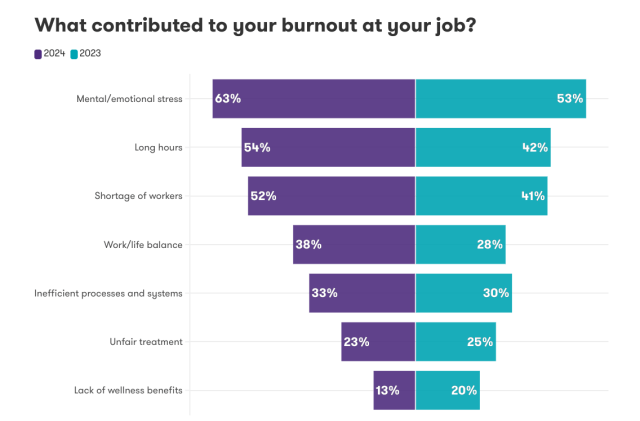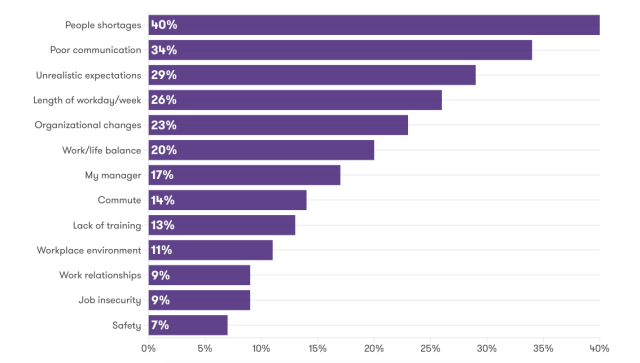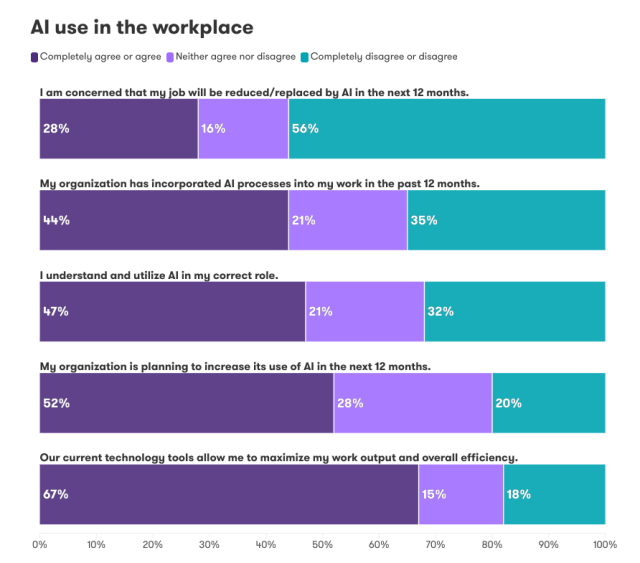Bad news, everyone. America is burned out. No, this isn’t going to be about the election.
Grant Thornton’s 2024 State of Work in America survey was released today and these key findings alone will make you depressed (if you aren’t already).
- 51% of respondents reported to have suffered burnout in the past year
- 63% named mental and emotional stress as the top cause of burnout
- 40% said people shortages are the most stressful part of working at their organization
Fun. It gets worse. The number of respondents suffering from burnout in the past year jumped by 15 percentage points from last year’s survey.
Respondents said the top causes of burnout were mental and emotional stress at 63%, followed by long hours at 54%.
Alongside the rise in burnout, respondents reported a decline in their overall well-being in 2024, noting a decline in key areas, including mental (32%) and financial (30%) health.
Said Joe Ranzau, managing director of Growth Advisory Services at Grant Thornton: “External factors such as increasing global conflicts, post-pandemic inflation and a particularly stressful political environment are all outside stressors that can burden the minds of employees, who in turn bring these worries with them into the workplace.” Tell us, are global conflicts and politics weighing on your mind at work?
Here’s what respondents had to say about why they’re burned out at work:

And here’s what they had to say about which parts of their job are most stressful:

Now let’s talk compensation. Rather, let’s let GT’s press release talk compensation:
When asked what initially drew them to their organizations, respondents cited benefits (48%) and base pay (45%) as the top two factors. These same elements also play a key role in retention, with 53% identifying benefits and 44% highlighting base pay as the main reasons they remain with their current employer.
Now, with rising costs and inflation continuing to impact households, employees are becoming more critical of their wages and the costs associated with their benefits. To address this, leaders must leverage market data to stay competitive, practice transparency regarding their organization’s financial standing and ensure clear pay practices are in place.
Alright, we’re with you so far.
Rob Ginzel, director of Growth Advisory Services at Grant Thornton, notes that, over the past few years, workers have had the advantage in compensation negotiations, resulting in widespread wage increases. However, inflation over the last year has eroded those wage gains, and the hiring dynamic is now shifting back toward an employer-favored marketplace.
“In times of financial constraints, employers need to recognize that compensation isn’t just about salary,” said Ranzau. “Employees value flexibility in areas such as work schedules, job content and how and where work is done. But employers should be mindful that when salaries are lower, trade-offs — such as adjusting workloads or expectations — may not be as effective in retaining talent.”
Accounting firms:

Continuing on:
An interesting finding from the survey is that only 10% of workers expressed concern about potentially being laid off in the next year, despite job security ranking highly as a motivator for staying with an organization. The survey also found that 25% of workers currently hold a second job, and 37% are considering one, which can quickly contribute to declining wellness and increasing burnout.
A lot of them are probably not all too concerned because they want to get laid off.

Respondents also seem to be fairly confident they won’t be replaced by AI in the next 12 months. To the statement “I am concerned that my job will be reduced/replaced by AI in the next 12 months,” 28% fell in the agree pile, 16% neither agreed nor disagreed, and 56% disagreed or completely disagreed. This despite AI being incorporated into many of their workplaces in the past year.

You can find the full survey here.
Grant Thornton survey: Employee burnout continues to surge as mental and emotional stress mount [Business Wire]


